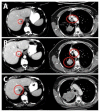Canadian consensus: oligoprogressive, pseudoprogressive, and oligometastatic non-small-cell lung cancer
- PMID: 30853813
- PMCID: PMC6380642
- DOI: 10.3747/co.26.4116
Canadian consensus: oligoprogressive, pseudoprogressive, and oligometastatic non-small-cell lung cancer
Abstract
Background: Little evidence has been generated for how best to manage patients with non-small-cell lung cancer (nsclc) presenting with rarer clinical scenarios, including oligometastases, oligoprogression, and pseudoprogression. In each of those scenarios, oncologists have to consider how best to balance efficacy with quality of life, while maximizing the duration of each line of therapy and ensuring that patients are still eligible for later options, including clinical trial enrolment.
Methods: An expert panel was convened to define the clinical questions. Using case-based presentations, consensus practice recommendations for each clinical scenario were generated through focused, evidence-based discussions.
Results: Treatment strategies and best-practice or consensus recommendations are presented, with areas of consensus and areas of uncertainty identified.
Conclusions: In each situation, treatment has to be tailored to suit the individual patient, but with the intent of extending and maximizing the use of each line of treatment, while keeping treatment options in reserve for later lines of therapy. Patient participation in clinical trials examining these issues should be encouraged.
Keywords: Non-small-cell lung cancer, advanced; nsclc, advanced; oligometastatic disease; oligoprogression; pseudoprogression.
Conflict of interest statement
CONFLICT OF INTEREST DISCLOSURES We have read and understood Current Oncology’s policy on disclosing conflicts of interest, and we declare the following interests: SAL has received honoraria from Pfizer, AstraZeneca, Boehringer Ingelheim, and Novartis; SB has served on advisory boards for AstraZeneca, Boehringer Ingelheim, Bristol–Myers Squibb, Eli Lilly, Novartis, Pfizer, and Roche, and has received research funding from AstraZeneca and Merck; NB has served on advisory boards for Amgen, AstraZeneca, Merck, Bayer, Boehringer Ingelheim, Bristol–Myers Squibb, Celgene, Eli Lilly, Novartis, Pfizer, Sanofi, and Roche; SB has received honoraria from AstraZeneca, Boehringer Ingelheim, Bristol–Myers Squibb, Eisai, and Merck; PKC has served as an advisor for AstraZeneca, Boehringer Ingelheim, Hoffmann–La Roche, Pfizer, Novartis, Takeda, Eli Lilly, and Bristol–Myers Squibb, and has received research funding from Boehringer Ingelheim and Hoffmann–La Roche; PC has received grants for investigator-initiated research projects from AbbVie, Pfizer, and Sanofi–Aventis; DH has served on advisory boards for AstraZeneca, Boehringer Ingelheim, Bristol–Myers Squibb, and Merck, and has received honoraria from Pfizer; VH has participated on advisory boards for AbbVie, AstraZeneca, Boehringer Ingelheim, Bristol–Myers Squibb, Merck, Pfizer, and Roche; RJ has served as an advisor or consultant for AstraZeneca/MedImmune, Bristol–Myers Squibb, Merck, Pfizer/emd Serono, and Roche, has received honoraria from AstraZeneca, Bristol–Myers Squibb, Merck, Pfizer/emd Serono, and Roche, and has received research funding from AstraZeneca, Bristol–Myers Squibb, and Merck; JL has received honoraria for talks from AstraZeneca, Boehringer Ingelheim, Pfizer, and Roche, and her institution has received grant funding for research trials from AstraZeneca, Boehringer Ingelheim, Eli Lilly, and Roche; in the last 2 years, NL has received honoraria for independent unrelated continuing medical education from AstraZeneca, Bristol–Myers Squibb, and Merck; DR has received honoraria and support from Accuray, BrainLab, Elekta, Pfizer/emd Serono, Siemens Healthineers, and Varian Medical Systems; JR has received speaker and advisory board fees and institutional research support for clinical trials funded by Astra-Zeneca, Bristol–Myers Squibb, Merck, Pfizer, and Roche; DJS has received honoraria (2015–2018) from Roche Canada, Boehringer Ingelheim Canada, Novartis Canada, Merck Canada, AstraZeneca Canada, Bristol–Myers Squibb Canada, Exactis Innovation, and Pfizer Canada, and has received institutional research support from Boehringer Ingelheim, AstraZeneca, Novartis, Bristol– Myers Squibb, and Celgene; MST has received honoraria from AstraZeneca, Bristol–Myers Squibb, Merck, and Roche/Ventana, and a research grant from Merck. The remaining authors have no conflicts to disclose.
Figures







References
Publication types
MeSH terms
LinkOut - more resources
Full Text Sources
Medical

